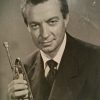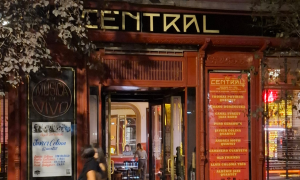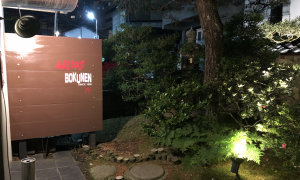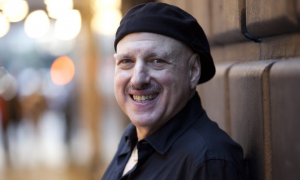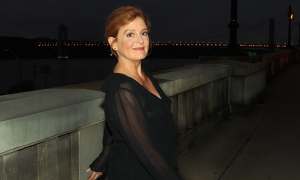Home » Jazz Articles » The Jazz Life » One of the Boys in the Band: Discovering my Dad
One of the Boys in the Band: Discovering my Dad
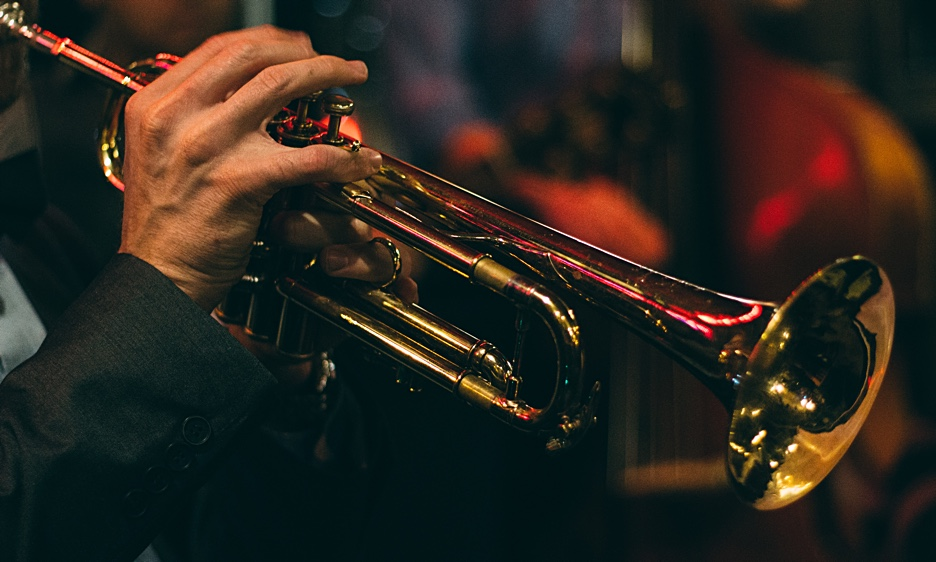
Courtesy Chris Bair
At the time, it really didn’t register with me that my dad was a famous musician, so I thought Mrs. Mitchell was just acting a little bit strange and it made me feel somehow funny, thinking of my dad in a way I had never done before.
—George Gozzard
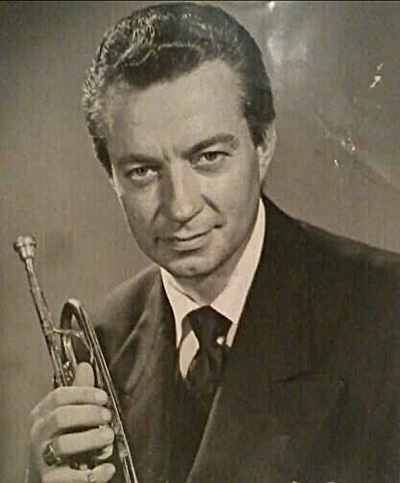 When I was in kindergarten, my teacher Mrs. Mitchell came up to me during class one day and told me how much she had enjoyed watching and listening to my dad perform at the Elmwood Casino the previous night. It was located just across the Detroit River in the beautiful City of Windsor close to where I grew up. At the time, it really didn't register with me that my dad was a famous musician, so I thought Mrs. Mitchell was just acting a little bit strange and it made me feel somehow funny, thinking of my dad in a way I had never done before. After all, my dad made his living playing the trumpet. At that age I thought, Didn't everyone's dad do something like that?
When I was in kindergarten, my teacher Mrs. Mitchell came up to me during class one day and told me how much she had enjoyed watching and listening to my dad perform at the Elmwood Casino the previous night. It was located just across the Detroit River in the beautiful City of Windsor close to where I grew up. At the time, it really didn't register with me that my dad was a famous musician, so I thought Mrs. Mitchell was just acting a little bit strange and it made me feel somehow funny, thinking of my dad in a way I had never done before. After all, my dad made his living playing the trumpet. At that age I thought, Didn't everyone's dad do something like that? I remember much later, in the late 1970s when I was about 15 years old, my dad, Harry Roy Gozzard, and I were watching The Tonight Show with Johnny Carson. While the band was playing, out of the blue he told me that he and Doc Severinsen had been in the Sam Donahue orchestra together in the latter part of the 1940s. They were making a lot of recordings with Capitol Records back then. That was perhaps the first time I realized how successful my dad had been as a professional big band trumpeter. He said that night that he had been the runner-up behind Severinsen for the band leader position on The Tonight Show! It was perhaps the second time that something about my dad had made me look at him differently. He was my dad, but he was also this other guy I didn't really understand then. He did creative stuff that other kids' dads just didn't do—he played music for people, and made records.
My dad could play a number of musical instruments, though the trumpet was his bread and butter. (I remember going up in the attic when I was a kid and seeing an old violin and a big double bass.) I, too, played the trumpet for a while until friends persuaded me to play sports instead. By sixth grade I could sense that even though I was a "natural" in being able to get a good note out of the trumpet, I was shy as a child. The thought of performing on a stage before a large audience was frankly daunting. I remember practicing trumpet one day in my parent's bedroom with one of my dad's older silver trumpets. For some reason, I started making sounds with that trumpet that got the attention of my older brother, Greg, who, like my dad, was a fine trumpet player. Greg was in his bedroom, probably practicing too, when he heard me. I remember that he walked into the room and looked at me funny. He said something like, "George, what are you doing? Do that again." I was like, "Do what again?" He said, "What you were just playing." Anyway, I started playing like I was playing. A few moments later, Greg opened the door and asked our dad to come in their bedroom. I played the same thing for him. While I was doing so, his eyes got real big and began to look at me in way that I had never seen him look at me before. Long story short, the way that he and my brother were now looking at me left a big impression on me that made me rethink what I had gotten myself into. And not in the way you may be thinking.
I started making excuses to them as to why I wasn't practicing as much as I used to. I often wonder what might have happened if I had stuck with it. Let this be a lesson to the young ones who want to throw in the instrument towel like I did. Don't do it... keep on practicing, because practice helps you make sense of the world. It really does make perfect.
Harry Gozzard, was born on March 5, 1916 on a farm in Shelburne, Ontario, Canada, not far from Toronto. At eight years of age, he, three siblings, and his parents emigrated to Detroit. About ten years later he met Sam Donahue there. Shortly after that my dad dropped out of high school and became a trumpet playing member of the Sam Donahue Orchestra. The band was often mentioned in the same company as Tommy Dorsey, Glenn Miller, Woody Herman, Count Basie, and Artie Shaw.
Though he's somewhat forgotten now, in an article written by Mike Zirpolo, for Swing and Beyond magazine, Donahue was described as "a superlative tenor saxophone soloist." Other members of Donahue's band besides Doc Severinsen, were the 1946 Esquire Award winner for Best New Female Vocalist Frances Wayne, and Grammy Award-winning vocalist and actress Jo Stafford. Gozzard and the Donahue band performed a few times with legendary piano-playing bandleader Count Basie, who was featured on four Donahue Okeh recordings made in New York on December 26, 1940
In 1938, Donahue went to work with the drummer Gene Krupa. But instead of disbanding the orchestra, Donahue turned over the leadership of his band to Sonny Burke. Music critic John Hammond Jr., who was very influential in the jazz world then, encouraged Burke to bring the band to New York. They landed a residency at the renowned Roseland Ballroom as well as a recording contract with Okeh Records. (Hammond was instrumental in igniting the careers of musicians such as Benny Goodman, Lester Young, Billie Holiday, Bob Dylan, Bruce Springsteen, Aretha Franklin and many others through his work with Columbia Records.) Sonny Burke's female vocalist was a woman named Lynne Sherman. At the end of 1940, an interesting photo of Sherman and my dad was published in a Down Beat magazine article. They had their arms around each other as they faced the camera. Were they an item? Who knows. My father never mentioned anything about her to me and I never thought to ask him. But being the curious person that I am, I did a little online research and long story short, Sherman married another trumpeter the following year, Milton Ebbins. (He had an illustrious career in the film industry, and was also an insider during the Kennedy administration.)
I knew that they performed at different venues across the U.S. while he was with Donahue's orchestra. I eventually found an article in Billboard magazine stating that they played a six-week engagement at the Casa Manana night club in Culver City, California, in the latter part of 1942, followed by another six-week engagement at the Hollywood Casino in Hollywood, California. Prior to that West Coast tour, they performed at the Beach Point Club in Mamaroneck, New York. I'm sure there are many more references about other venues, but I feel as if I satisfied another curiosity of mine regarding the puzzle that is my dad's musical career.
A few months before I started writing this piece, I sent an email to Lynne Warfel, an announcer for a nationwide classical music program called "Saturday Cinema." I asked her if she would play one of Sonny Burke's songs from The Lady and the Tramp soundtrack. I mentioned that my dad worked with Burke, and thought it'd be really cool to hear a film song from his onetime boss.
So, on June 3rd, 2023, as I worked on this article, I walked into my bedroom and heard one of the songs from the soundtrack. What a surprise!. For a moment, I thought I was in the Twilight Zone. Lol! Anyhow, immediately after hearing Burke's song, I sent Lynne another email to thank her for playing it. When Donahue left Krupa in 1940 he wanted his band back. Burke obliged by letting the band members vote on who they wanted as their leader. His sidesmen voted to go with Donahue. Burke left gracefully. And despite that bump in the road, he ended up having an amazing career in show business. So, my dad was now with Donahue again, up until 1942 when Donahue was drafted into the Navy because of WWII. (He soon took over Artie Shaw's Navy band after Shaw returned to San Francisco)
That year, my dad became a member of Jan Savitt's orchestra and made a few recordings produced by Bluebird Records. After the war was over, Donahue formed a new band, and my dad again became a member. Then in 1948, Doc Severinsen joined the band. After Donahue reenlisted in the Navy in 1952, my dad began playing in an orchestra at the Elmwood Casino. The Elmwood was a premier nightclub for the residents of Metro-Detroit and Southern Ontario. Many well-known entertainers performed there, including Sammy Davis, Jr., Ann Margaret, Tony Bennett, Bob Newhart, Patti Page and Tom Jones. My dad rubbed shoulders with them all and then some more besides. That gig became his steady work during the 1950s, 60s and 70s. I came along fairly late in his life, and looking back I can see that was when he went from essentially being a touring musician to a man who lived at home, and helped raise a family playing big band gigs at night with some of the leading entertainers of the day.
When I was a kid, I often wondered why my dad hardly ever went on long trips with the rest of the family, mainly to Kentucky and Florida. I asked him one day and he said, "George, I've traveled all over the country and have seen everything in every state. I am tired of traveling." He didn't say it angrily, but he did impress me with his firmness that he had had it with long trips, and not to try to talk him into going on another one, even with us. I can only imagine how tiresome all that non-stop touring across the country in cars, buses, trains and planes got to be.
My dad retired from the big band way of life when I was young, but he still did gigs, and I had the opportunity to watch him perform live on stage a few times. During the 1960s, for example, he played on the St. Claire and the Columbia riverboats. The St. Claire and the Columbia transported excited passengers down the Detroit River to the locally famous Bob-Lo Island Amusement Park. The cruise was about a two-hour long voyage that originated from Detroit. Cruising down the Detroit River while watching my dad play his trumpet before a live audience of hundreds of people and getting to play all day at Bob-Lo was probably one of the coolest things that I ever did when I was a kid.
Another cool memory I have is of my dad performing in the band for the Al Kaline Day celebration at Tiger Stadium in Detroit, on August 2, 1970. (For those who don't know, Al Kaline was the Detroit Tigers' right fielder for 22 seasons.) The legendary singer/songwriter Mel Torme sang "Thanks for the Memory." It was a memorable baseball game, made more so due to the fact that my dad decided to bring my mom and all of us kids, and was late getting to the stadium. As you can imagine, getting a large family like ours ready for a notable event was a monumental task. I vividly remember the "commotion" going on. It reminds me now of that scene in the first Home Alone movie when everyone is rushing around getting ready for their big flight to Paris. I was the youngest in my family, and I can only say that unlike the character Kevin in that movie, I'm so glad that I didn't get mistakenly left behind at home and miss out on being a part of a really cool experience. Long story short, in order to kick off the festivities for Al Kaline's big day ), the band and a sold-out crowd of 50,000 anxious fans had to wait for their tardy trumpeter to arrive!
The absolute coolest memory that I have of my dad performing was the time when he played at the "Grand Hotel." It's a ritzy hotel that is situated on picturesque Mackinac Island. Even to this day, it's still a great place to visit. I was about 10 years old, and my dad was playing two back-to-back summertime shows there. Since Mackinac Island was located roughly 300 miles away from where we lived, he decided to leave my mom and all of his children at home for the summer when he went up there. To commute back and forth every weekend was simply out of the question.
Greatly missing him during the second summer, my brother Greg and I drove all the way up there to visit him for a few days. Actually, we first drove to Mackinaw City. From there, we hopped on a high-speed ferry and cruised to the island. As soon as we arrived safely on Mackinac Island, our dad happily greeted us as the boat docked. He then took us for a stroll down the main street of the small town. We immediately began to experience what it was like to live in an earlier age of long ago. No cars were permitted on the island at the time. At first, it was very strange not being able to hear the sound of one single motor. However, I did get used to it real quick. Actually, it was rather nice not hearing the sounds of motors, horns and squealing tires for a few days. The night that I saw my dad play in the majestic "Grand Hotel" ballroom was really special. I felt like I was in an old 1940's movie. There were people all over that ballroom dressed in formal attire, dancing to the swinging beat of the "Big Band" sound. There was my dad, part of the trumpet section, once in a while standing up and taking a solo before sitting back down and taking his place among the rest of the band while the band swung and people danced the night away. It's a memory of my dad that I'll cherish forever!
I have come to realize that my dad was one of those guys you see in big band pictures, excellent musicians playing swinging arrangements behind headliners, but anonymous to most people watching and listening. A man who epitomized the hard-working, hard playing musician, who tasted fame for himself while accompanying the even more famous, and still managed to maintain a career and family (with no small thanks to my mom as well!) and do what he loved to do most and best, something many of us can't say about our own lives. Writing this article has allowed me to keep the memory of my dad alive. It's been a long time remembering him, finding out stuff about him I never knew before, and writing about my fantastic father, Harry Roy Gozzard, jazz trumpeter! Thanks, Dad.
Harry Roy Gozzard and Doc Severinsen, playing together in the Sam Donahue band in 1948.
Tags
The Jazz Life
Peter Rubie
Harry Gozzard
Doc Severinsen
Sam Donahue
Tommy Dorsey
Glenn Miller
Woody Herman
Count Basie
Artie Shaw
Frances Wayne
Jo Stafford
Gene Krupa
Sonny Burke
John Hammond
Benny Goodman
Lester Young
Billie Holliday
Bob Dylan
Bruce Springsteen
Aretha Franklin
Lynne Sherman
Milton Ebbins
Lynne Warfel
Jan Savitt
Sammy Davis, Jr
Ann Margaret
Tony Bennett
Bob Newhart
Patti Page
Tom Jones
Mel Torme
PREVIOUS / NEXT
Support All About Jazz
 All About Jazz has been a pillar of jazz since 1995, championing it as an art form and, more importantly, supporting the musicians who make it. Our enduring commitment has made "AAJ" one of the most culturally important websites of its kind, read by hundreds of thousands of fans, musicians and industry figures every month.
All About Jazz has been a pillar of jazz since 1995, championing it as an art form and, more importantly, supporting the musicians who make it. Our enduring commitment has made "AAJ" one of the most culturally important websites of its kind, read by hundreds of thousands of fans, musicians and industry figures every month.

